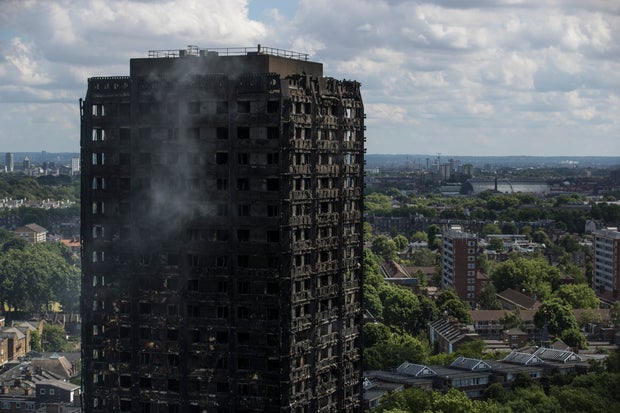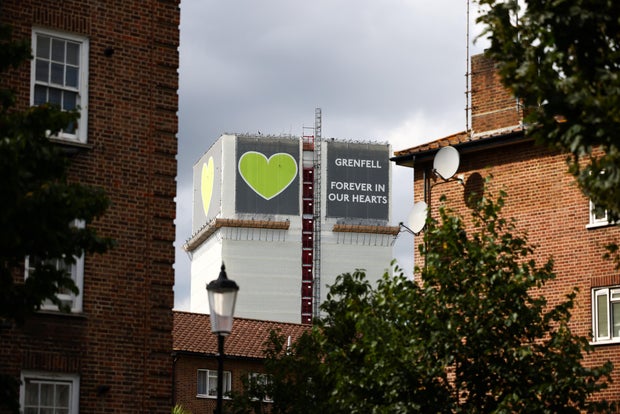Grenfell Tower fire inquiry says U.S. company Arconic

London — The public inquiry into the deadly 2017 fire that engulfed Grenfell Tower, a high-rise public housing apartment building in central London, published its final report Wednesday on the disaster that killed 72 people. The blaze — London’s deadliest since World War II — was blamed on a litany of failures, from shoddy construction and materials to poor local management and inadequate fire safety standards.
Retired judge Martin Moore-Bick, who headed the inquiry, said all the deaths were avoidable, and that while no single cause could be blamed for the disaster, a number of factors and entities “contributed to it in one way or another, in most cases through incompetence, but in some cases through dishonesty and greed.”
Among the parties found to have played a role in the tragedy by the inquiry is the American company Arconic, which made and sold the building’s exterior cladding through a French subsidiary.
Dan Kitwood/Getty
The report’s authors said the Pittsburgh-based company “deliberately concealed from the market the true extent of the danger of using” the materials that were added to Grenfell Tower during a renovation, “particularly on high-rise buildings.”
“By late 2007 Arconic had become aware that there was serious concern in the construction industry about the safety of ACM panels and had itself recognized the danger they posed,” the report says. “By the summer of 2011 it was well aware that Reynobond 55 PE in cassette form [the material used on Grenfell Tower] performed much worse in a fire and was considerably more dangerous than in riveted form. Nonetheless, it was determined to exploit what it saw as weak regulatory regimes in certain countries (including the UK) to sell Reynobond 55 PE in cassette form, including for use on residential buildings.”
In a statement to CBS News on Wednesday, Arconic said it rejected “any claim that AAP [Arconic’s subsidiary, Arconic Architectural Products SAS] sold an unsafe product,” and insisted it had “regularly conducted tests of its materials using third-party testing bodies.”
“Reports on these results were all publicly available, and AAP made these reports available to its customers,” the company said, adding that it “did not conceal information from or mislead any certification body, customer, or the public.”
Arconic said AAP had “acknowledged its role as one of the material suppliers involved in the refurbishment of Grenfell Tower,” and that the company “respects the Inquiry process” and “cooperated fully with the work of the Inquiry and will continue to engage with further legal processes.”
“Together with other parties, AAP has made financial contributions to settlements for those affected, as well as to the restorative justice fund,” the company said.
Ongoing inquiry
Earlier phases of the multi-year inquiry concluded that some of the companies that manufactured the materials used in the exterior cladding on Grenfell Tower, including Arconic, continued to market their products as safe despite some employees knowing they were flammable.
Emails shared with the inquiry appeared to show that some Arconic employees knew of the fire risk associated with the cladding product used on Grenfell Tower, but that the company continued to sell it anyway.
When approached in 2021 about whether its employees knew about the fire risks associated with the cladding, Arconic told CBS News it was “continuing to offer their full support to the authorities as the inquiry works through the complex questions presented. It is not appropriate for us to comment further while the Inquiry is ongoing and before all evidence has been presented in Phase Two.”
HENRY NICHOLLS/AFP/Getty
“These corporations are still operating as if nothing has happened,” Karim Mussilhy, whose uncle was killed in the fire, told CBS News in 2021.
In the wake of the deadly blaze, apartment buildings across the U.K. that were covered in the same or similar external cladding materials were found to be unsafe, leaving thousands of people trapped in dangerous homes and unable to sell because banks won’t provide new mortgages on the properties in question.
“People should be safe in their homes. People shouldn’t have to feel like they’re going to sleep and not knowing if they’re going to wake up or not,” Mussilhy said in 2021.
Victims still seeking justice
The Grenfell Inquiry launched with a first hearing on Sept.14, 2017. The families of some victims and survivors said they had been denied justice as it went on.
“It’s meant criminal prosecutions couldn’t have happened,” said Nazanin Aghlani, whose mother Sakina Afrasehabi was killed in the fire. She told CBS News’ partner network BBC News that prosecutions should have happened before the public inquiry.
She said the inquiry had even given “all those people that should be facing criminal prosecutions” a platform “to tell their version of the story.”
U.K. prosecutors said Wednesday they were unlikely to file any charges over the fire until the end of 2026, citing the “sheer volume of evidence and complexity of the investigation.”
“When you hear that everything was avoidable, and because of their dishonesty, you have anger inside you,” Karim Khalloufi, whose sister Khadija died in the fire, told the BBC on Wednesday. “What are they waiting for, to make charges, to make criminal prosecutions, manslaughter? So why are we going to wait more years, three or four or five years to have this justice?”
“We’ve been waiting seven years to find out the facts, that are gonna be in black and white,” Nick Burton, who was rescued from the 19th floor of the tower, told the BBC, hoping the report would “tell the truth about these corporations and their part that they played in the fire.”
London Mayor Sadiq Khan supported the calls for swift justice, saying “those responsible must now be immediately held to account for their systematic dishonesty, corporate greed, institutional indifference and neglect.”
“Companies found to have been to blame by the inquiry must no longer receive any public contracts, as the police and CPS look into the bringing of criminal charges,” Khan added.
British Prime Minister Keir Starmer also pledged to take action, telling lawmakers on Wednesday that his government would “write to all companies found by the inquiry to be part of these horrific failings as the first step to stopping them being awarded government contracts.”
Starmer said in a separate statement that the building’s residents had been “ignored” and left in “a death trap,” voicing what he called a “profound determination” to ensure that the disaster brought about “defining changes in the memory of Grenfell.”











